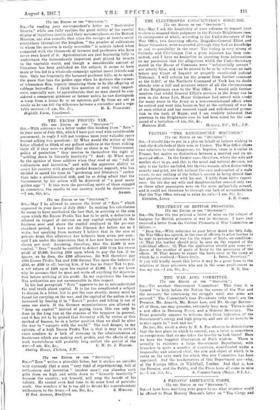VISITING "TICE DANGEROUSLY WOUNDED."
(To nu Emma or rue "Sera-rtroa."1
SIR.—I should like to put in a plea on behalf of fathers wishing to visit the death-beds of their sons in France. The War Office allows two relatives to visit dangerous, i.e. hopeless, cases in hospital in France, but makes no distinction between a married and an un- married officer. In the former case, therefore, where the wife and mother elect to go, and this is the usual and natural decision, not only is the father excluded, but the two women, often distracted by anxiety and grief, are left without the care and comfort of a male escort, to say noticing of the father's sorrow in being denied that last priceless interview with his son. I write from bitter experi- ence. On the day my wife and daughter-in-law crossed only two or three other passengers were on the same melancholy errand, and it could not therefore be through any lack of accommodation that the War Office refused to relax its rule--I am, Sir, dm.,


























 Previous page
Previous page